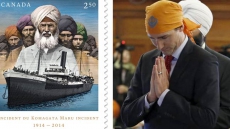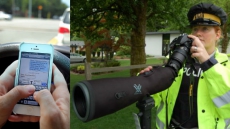TORONTO — A private Christian university that forbids sexual intimacy outside heterosexual marriage will be in Ontario's top court this week, seeking a green light for its proposed law school after the province's law society denied it accreditation.
It's the latest legal battle for British Columbia-based Trinity Western University, which is fighting similar cases at appeal courts in Nova Scotia and British Columbia.
The case that will be heard Monday at Ontario's Court of Appeal sees the university go up against the Law Society of Upper Canada, with both sides arguing the other is being discriminatory.
At the core of the dispute is Trinity Western's "community covenant" or code of conduct, which the Evangelical Christian institution requires all students to agree to.
It includes requiring students to abstain from gossip, obscene language, prejudice, harassment, lying, cheating, stealing, pornography, drunkenness and sexual intimacy "that violates the sacredness of marriage between a man and a woman."
The university notes, however, that it does not ban admission to gay, lesbian, bisexual or transgender students or faculty, and said its community offers "an environment in which sexual minorities are supported, loved and respected."
"This appeal is about protecting the members of a minority religion in our pluralistic society. TWU serves Canada's evangelical Christian community. It's law school will allow evangelical Christians to study and contemplate the law according to, and in an environment that supports their beliefs," lawyers for the university argue in documents submitted to the appeal court.
"The LSUC refused to accredit TWU because of those religious beliefs, and not because TWU's students would not meet appropriate standards of learning, professional competence and professional conduct."
The law society voted in April 2014 not to accredit the university's proposed law school, citing its controversial covenant as discriminatory. The university applied for judicial review of the decision but was dismissed by an Ontario court, paving the way for its latest round of legal sparring.
The university argues that the law society infringed not only on freedom of religion rights, but also on freedom of expression, freedom of association and equality rights with its decision.

"The LSUC's decision is incorrect and, at the least, unreasonable," lawyers for the university wrote.
"Absent any evidence that the Community Covenant will impair TWU's graduates from being appropriately educated, competent or ethical (and there is none), there is no basis for the LSUC to violate TWU's and its students' fundamental constitutional rights in the name of the 'public interest.'"
The Law Society of Upper Canada, however, found Trinity Western's covenant highly problematic.
"Accrediting TWU would violate the law society's core commitment to equality of individuals and groups of diverse beliefs and backgrounds, and would discriminate against individuals based on sexual orientation, gender, marital status and religion," the society's lawyers argued.
"The appellants are not entitled to compel the law society to abandon its policy of ensuring equal access to the legal profession, or to violate its obligations of equality under the Charter and the Code.
The society further argued its decision does not infringe on the university's rights.
"The law society has determined that it is in the public interest not only to have equal access to the profession, but also to have a profession that is diverse and reflective of the population of Ontario. Hence, the law society has adopted policies that promote equity and diversity and combat discrimination on any basis."


